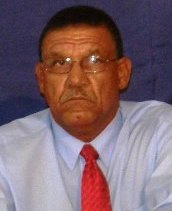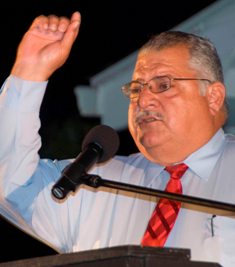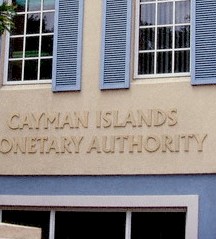Archive for July 12th, 2010

Planning changes cause alarm
 (CNS): The proposal by government to remove the need for approval by the Legislative Assembly to future changes to the planning regulations has met with considerable opposition. The independent member and the opposition members have all pointed to this particular amendment as being a dangerous move and one which will prevent them supporting the proposed amendments to the current planning law. Arden McLean said the amendment would circumvent the rights of the people and questioned whether it was the first step towards changing the land use in East End in order to facilitate the East End cargo dock.
(CNS): The proposal by government to remove the need for approval by the Legislative Assembly to future changes to the planning regulations has met with considerable opposition. The independent member and the opposition members have all pointed to this particular amendment as being a dangerous move and one which will prevent them supporting the proposed amendments to the current planning law. Arden McLean said the amendment would circumvent the rights of the people and questioned whether it was the first step towards changing the land use in East End in order to facilitate the East End cargo dock.
The East End opposition member said that for five people alone to be responsible for deciding how land is used without consultation with the people was unthinkable and warned that if the law passed with this amendment the first people may know about changes to their neighbourhood would be when a garbage dump appeared by their homes. He said the importance of land use was such that the people who created the planning law had written in the need to consult parliament over any changes to it.
“The original architects of this law knew what they were doing,” McLean told the Legislative Assembly on Monday morning, as he explained that by bringing regulation changes in the planning law to the House they would be public. “I believe the provision was deliberate. There is nothing more important than land use. It is necessary that the people are made aware when there are changes.”
While other laws do have regulations changed in Cabinet, McLean pointed out that planning was the exception because of its wide impact on everyone in the community. He said there was no reason to remove the provision for the planning regulations to be approved by the Legislative Assembly and he wondered at the real motivation.
“I have been reliably informed that this government was going to change the zoning to allow for the cargo dock,” he said, referring to proposals to move the George Town cargo operations to his East End constituency, to which McLean has said he and the people he represents are opposed.
“Is this the first step in trying to circumvent the legislation so no one will know until it has been gazetted?” he asked rhetorically. “That is a very dangerous thing,” McLean added.
He said government could not dictate to people in a democracy and just change people’s way of life without consulting them, and only in Russia would governments do such things. He pointed out the need for people to have a say on such important matters and that was why there was an opposition. “You think opposition is just for opposition sake,” he questioned, pointing out that, while the government may never listen, at least the people get to know what government is proposing when things are discussed in the Legislative Assembly.
He explained that all of the people’s elected representatives had to know when changes to land use were being planned, not just the five Cabinet members.
The East End representative went on to implore the press to tell people what government was planning to do. “The people need to know that theirrepresentatives will be circumvented,” McLean said of clause 12 in the proposed amendment to the current Development and Planning Law.
Leader of the Opposition Kurt Tibbetts said that, while there were many things in the law which he and his colleagues could support, he agreed that unless this proposed amendment was removed the PPM would not support it.
Ezzard Miller, the member for North Side, also said he could not back the law, despite supporting a number of the proposed changes, because of this particular amendment. He also objected to clause 15, which would allow the governor in Cabinet to waive any requirements under the law if it was in the public interest.
Pointing to the need for the public to be informed of any changes to planning regulations, Miller said the use of land could be changed in his district and his constituents may never know until it was too late. He used the example of the current proposed National Conservation Law when he said that his constituents had been trying “to fight off environmental zealots” who could cause land use to be changed rendering land worthless without public knowledge.
The debate on the amendments is set to continue this afternoon.

Police arrest suspected mugger in George Town
 (CNS): Police confirmed today that a 36-year-old man has been arrested and is currently in police custody on suspicion of robbery and possession of an offensive weapon following a mugging last week. At about 2.10 am on Thursday 8 July a man claiming to be in possession of a gun threatened another male in Fairbanks Road, George Town. The suspect then tore a necklace from around his victim’s neck and ran off towards nearby bushes.
(CNS): Police confirmed today that a 36-year-old man has been arrested and is currently in police custody on suspicion of robbery and possession of an offensive weapon following a mugging last week. At about 2.10 am on Thursday 8 July a man claiming to be in possession of a gun threatened another male in Fairbanks Road, George Town. The suspect then tore a necklace from around his victim’s neck and ran off towards nearby bushes.
The victim said he did not see a gun during the robbery and no-one was injured in the incident. At about 7.55 pm on Sunday night (11 July) USG officers carried out an operation in relation to the robbery. As officers approached the suspect in Diaz lane, George Town, he produced a knife. The officers quickly disarmed the suspect who was then arrested and taken into police custody.
None of the officers involved in the incident were injured and police said the enquiries are ongoing.

More fee increases coming
 (CNS): When the Legislative Assembly resumes this morning (Monday 12 July) the members will be deliberating amendments to the Planning Law in which the government has proposed increases to the infrastructure fees and to introduce a significant daily fine for those who do not maintain their property. Speaking in the LA on Friday as he presented the bill, the premier said he expected to be criticised but he believed that Cayman would see another development boom and when it came he wanted to ensure the country benefited from it. “I know these fee increases may seem heavy and I will be criticised for stifling development, but they are better than property and income tax,” McKeeva Bush said.
(CNS): When the Legislative Assembly resumes this morning (Monday 12 July) the members will be deliberating amendments to the Planning Law in which the government has proposed increases to the infrastructure fees and to introduce a significant daily fine for those who do not maintain their property. Speaking in the LA on Friday as he presented the bill, the premier said he expected to be criticised but he believed that Cayman would see another development boom and when it came he wanted to ensure the country benefited from it. “I know these fee increases may seem heavy and I will be criticised for stifling development, but they are better than property and income tax,” McKeeva Bush said.

Dangers of permitting gambling in Cayman
The United Church in Jamaica and the Cayman Islands has always opposed gambling. This is principally because it is contrary to our Christian beliefs, but it affects all of society, with the evidence that gambling leads to a deterioration of the social fabric as it exploits human weaknesses, undermines work ethic, leads to increased crime, is destructive of family life and promotes personal and institutional greed. It exploits the most vulnerable in society and represents a major transfer of resources from the very poor to the very rich.
The United Church understands that government needs to broaden its revenue base. Various proposals for a national lottery and casinos have been brought up in the past, giving similar reasons, namely that government was running out of options to raise revenue. However, the country has managed to get by and find ways to keep the country prosperous without resorting to legalised gambling. It can continue to do so. An editorial on the subject in the Christian Science Monitor said it well: “A nation that fosters a reliance on chance and officially endorses a culture of irresponsibility all in the name of increased revenues and free enterprise is certainly playing games with its moral foundations.”
Crime is a serious, escalating problem in the Cayman Islands. Statistics from around the world substantiate that gambling increases crime. The poor and the youth are most vulnerable but the problem of gambling can affect anyone regardless of age, gender, race, or social status. The Commonwealth nation of Australia, that has long advocated gambling as a national pastime, is now reviewing its policy because of the growing rate of addiction and the impact on the social fabric of the nation.
It is estimated that 10% of problem gamblers and two thirds of those who are receiving counselling have committed a crime because of their gambling. The first gambling-related crime is often perpetrated in the same year as, or just a few years after, starting regular gambling.
Gambling crime can be divided into four categories: illegal gambling, crimes committed to support a gambling habit, crimes that occur around the gambling locations, family abuse.
The major reason for gamblers to commit crimes is to fund their gambling activities. Gambling crime includes theft, forgery, embezzlement, fraud. It can also include domestic violence, assault, child neglect, suicide, prostitution, vandalism, breaking and entering, and home invasion. A significant amount of the crime related to gambling is not reported to authorities.
Organised crime has a big stake in the gambling industry. One former Florida gGovernor has said, “The Mafia follows gambling like sharks follow blood.” Casinos are particularly attractive to organised crime. Casinos present ideal opportunities for the skimming of profits as well as the laundering of moneys already earned through crime. Related crime such as loansharking and prostitution follow closely.
Local proponents of gambling emphasise the supposedly tremendous employment benefits but have not published hard facts to support this contention. In the US, there have been, instead, reports of the grave economic difficulties faced by many employees of casinos. We certainly cannot afford to have any more people in Cayman being employed in poverty creating jobs. A study published by the Federal Reserve Bank of St. Louis summarised that: “The employment effects of casino gaming are difficult to quantify. A casino may draw labor from outside of the local area, thus leaving local employment conditions unchanged … It is possible that casino gaming may reduce employment in other local industries… The net effect of gaming could be positive or negative depending upon the degree to which casino gaming substitutes for or complements consumption at other local businesses.”
That possibility should not be overlooked here, where existing businesses are struggling to maintain their individual share of the tourist’s wallet. With casino gambling now so readily available in the US and our neighbouring islands, surely the question must be asked as to how will Cayman outshine their gambling industries that would cause tourists to incur the higher expense of a Cayman vacation to do what they can do at home or in one of our lower-cost neighbours. Certainly it seems basic to ask how will gambling differentiate our tourism product from that of our competitors where it is already available. It is widely suggested that this blurring of our tourism product in recent years has been a major factor in its relative decline and instead we must seek to recapture the differential advantage we previously offered.
The Cayman Islands has traditionally been known for its friendly, hospitable, Christian, hard working people. Crime used to be almost non-existent. We must all work together to restore that reputation. Introduction of legalised gambling will not do this. Government has a moral responsibility to enact laws which do not undermine or weaken the moral fabric of society. Let us clearly convey this to our elected representatives as they seek to hear the will of the people. Cayman can learn from the serious problems encountered by other countries that have extensive gambling and not follow down that same path. Any potential short term gain does not justify the long term detrimental effects that gambling will have on our society.

Kurt hits out at Mac comment
 (CNS): Following comments by the premier to the Jamaican Gleaner last week, the leader of the opposition has criticised him for making mischief on the international stage. In an interview with the paper during his visit to Jamaica, McKeeva Bush said he expected the opposition would not be happy about any moves he made to remove the Cayman visa requirement for visiting Jamaicans already holding a US visa. However, Kurt Tibbetts pointed out that while in office his administration had made efforts in the same vein but they were stalled as a result of issues with the Jamaican government. Tibbetts also noted the visa requirement was imposed at the requests of Cayman’s law enforcement agencies. (Photo Dennie Warren Jr)
(CNS): Following comments by the premier to the Jamaican Gleaner last week, the leader of the opposition has criticised him for making mischief on the international stage. In an interview with the paper during his visit to Jamaica, McKeeva Bush said he expected the opposition would not be happy about any moves he made to remove the Cayman visa requirement for visiting Jamaicans already holding a US visa. However, Kurt Tibbetts pointed out that while in office his administration had made efforts in the same vein but they were stalled as a result of issues with the Jamaican government. Tibbetts also noted the visa requirement was imposed at the requests of Cayman’s law enforcement agencies. (Photo Dennie Warren Jr)

Search on for the next Miss Cayman
 (CNS): Having missed the competition in 2009 as a result of financial problems the committee has announced the return of Miss Cayman for 2010/11. Members said the pageant is back on track and will take place on Saturday, 25 September at the Lion’s Centre when the new ‘face’ of the Cayman Islands will be selected to represent the country at Miss World, Miss universe and as a tourist ambassador for the destination. The competition is open to women between18-25 and those interested in entering are invited to attend the preliminary Meet & Greet session scheduled for 14 July at Abacus restaurant in Camana Bay, starting at 6 pm.
(CNS): Having missed the competition in 2009 as a result of financial problems the committee has announced the return of Miss Cayman for 2010/11. Members said the pageant is back on track and will take place on Saturday, 25 September at the Lion’s Centre when the new ‘face’ of the Cayman Islands will be selected to represent the country at Miss World, Miss universe and as a tourist ambassador for the destination. The competition is open to women between18-25 and those interested in entering are invited to attend the preliminary Meet & Greet session scheduled for 14 July at Abacus restaurant in Camana Bay, starting at 6 pm.

CIMA admits weaknesses in SIBL
 (CNS): Following questions by CNS readers about Cedrus Investments, the Cayman Islands Monetary Authority (CIMA) has issued a statement indicating that it could be the law rather than CIMA which is at fault. OffshoreAlert, the Miami based newsletter, published an article this month raising concerns about the owner of Cedrus and asking if local financial institutions in Cayman doing business with it had done the due diligence. Explaining that the firm is registered as an ‘Excluded Person’ under the Securities Investment Business Law and is exempt from holding a license, CIMA indicated it could not refuse to register such an entity if the legal requirements were met. The authority also noted that the financial service providers are obligated to carry out the appropriate due diligence on their clients.
(CNS): Following questions by CNS readers about Cedrus Investments, the Cayman Islands Monetary Authority (CIMA) has issued a statement indicating that it could be the law rather than CIMA which is at fault. OffshoreAlert, the Miami based newsletter, published an article this month raising concerns about the owner of Cedrus and asking if local financial institutions in Cayman doing business with it had done the due diligence. Explaining that the firm is registered as an ‘Excluded Person’ under the Securities Investment Business Law and is exempt from holding a license, CIMA indicated it could not refuse to register such an entity if the legal requirements were met. The authority also noted that the financial service providers are obligated to carry out the appropriate due diligence on their clients.